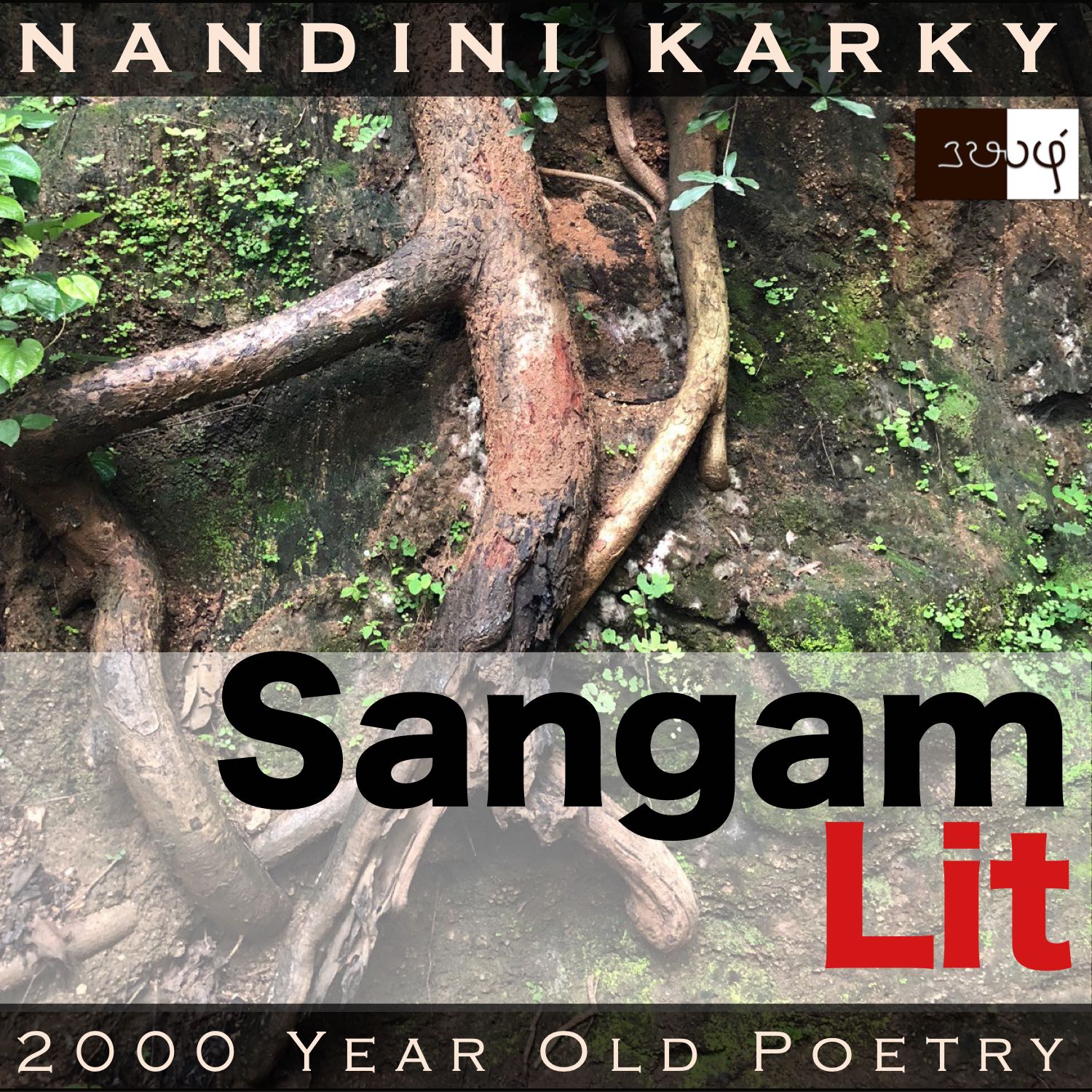Podcast: Play in new window | Download
Subscribe: Apple Podcasts | Spotify | Amazon Music | Android | iHeartRadio | TuneIn | RSS | More

In this episode, we perceive the unshakeable faith in the mind of a lady, as depicted in Sangam Literary work, Natrinai 289, penned by Marunkoor Pattinathu Chenthan Kumaranaar. The verse is set in the forest landscape of ‘Mullai’ and speaks in the voice of the lady to her friend, expressing both angst and assurance, as she faces the delay in the man’s return.
அம்ம வாழி, தோழி!-காதலர்,
நிலம் புடைபெயர்வதாயினும், கூறிய
சொல் புடைபெயர்தலோ இலரே; வானம்
நளி கடல் முகந்து, செறிதக இருளி,
கனை பெயல் பொழிந்து, கடுங் குரல் பயிற்றி,
கார் செய்து, என் உழையதுவே; ஆயிடை,
கொல்லைக் கோவலர் எல்லி மாட்டிய
பெரு மர வேரடி போல,
அருள் இலேன் அம்ம; அளியேன் யானே.
The verse opens with ‘அம்ம வாழி, தோழி’, a phrase we have often encountered in our Sangam readings, and it means ‘listen and may you live long, my friend’. A moment to appreciate this custom of blessing someone when requesting them to listen, as if to say, I give you my blessing, please give me your attention. An emphatic phrase arrests our attention in ‘நிலம் புடைபெயர்வதாயினும்’ meaning ‘even if the land were to stray from its path’. Let’s explore the deeper meaning of what this means in a while. Now, turn our attention to the successive phrase, ‘சொல் புடைபெயர்தலோ இலரே’ meaning ‘there will be no straying from his promise’, the core message of this verse! We then get to meet ‘கொல்லைக் கோவலர்’ meaning ‘cowherds in the forest’ and ‘பெரு மர வேரடி போல’ meaning ‘the root of a great tree’. Ending with ‘அளியேன் யானே’, meaning ‘I am to be pitied’, the poem invites us to listen with empathy.
The man and lady had been leading a happy, married life when the man had to part away on a mission. Before he leaves, he promises to be back before the rains. The lady waits patiently and then, signs of rain start to appear on the skies. One such day, she turns to her confidante and says, “Listen, my friend, may you live long! Even if the world were to swerve from its path, my lover is not one to swerve from his word. The sky, dipping in cold waters, filling itself to the brim, darkens and pours down as heavy rain, with harsh thunder resounding, creating this season of rain to torment me. Here, akin to a huge tree’s broken root that has been set to fire at night by forest cowherds, I have not been graced, my dear. Pitiable, I am!” With these words, the lady relates the burning pain in her heart and also, gives word to her confidence in the man’s promise to return.
Time to explore the nuances! The lady with an affectionate invitation asking her friend to listen, talks about how even if the land were to move away from its path, the man wouldn’t move away from his words. Zooming on to that expression about the land and its path, what does it mean? Is this a reference to earthquakes and the land splitting open? Or is it a higher understanding of the earth’s place in the solar system and its orbit around the sun? Did the ancients understand our place in the universe? These are questions which cannot be answered by a single line or verse. Let’s hold on to that question and pursue the interpretation, which seems acceptable to us. I understand these words to be in the lines of ‘even if the sun were to rise in the west’ and is spoken to present a rich contrast to the following lines about the man keeping his word. Such is the lady’s belief in her man that she says the world can turn topsy-turvy, but the lord will not stray from his word. Then, the lady says even though that is the case, the skies seem to have something against her, for they have gone and gotten themselves sloshed with seawater and now are pouring down the rain, with the sound of thunder cheering them on. All this is no cheer for the lady, as it tortures her deeply. The lady seems to say that the skies are at fault for making it rain earlier than it should. Why ‘earlier than it should’? Because her man said he would be back before the rains and he hasn’t returned, has he?
The lady then describes a scene in those forests, where cowherds burn the protruding root of a tree at night, possibly to keep off wild animals from their cattle. The lady describes how she feels like that burning root, with no one to quench the fire of sadness in her. The lady finishes by expressing to the confidante about what a pitiable state she is now in. In the same verse, we see how the lady reflects her deep belief in the man’s promise and at the same time, seeing the circumstances outside, suffer, and express that suffering too. A verse that seems to give permission to the mind to be in conflicting states, to feel positive and to feel sadness, as if to say the mind isn’t some rigid, absolute thing, but a flowing river of emotions!




Share your thoughts...